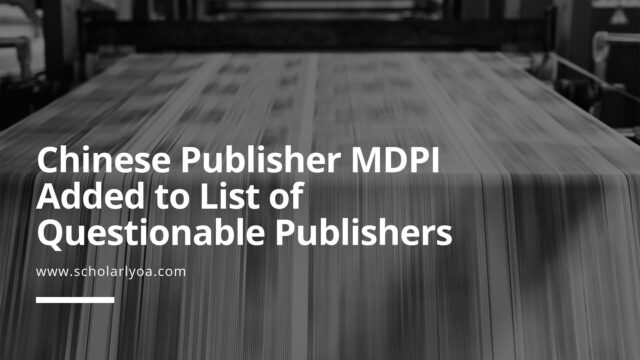
UPDATE 2015-11-13: MDPI has been removed from the list following a successful appeal.
Updated 2014-02-27
I have added the Chinese publisher MDPI (Multidisciplinary Digital Publishing Institute) to my list of questionable publishers. This is not a decision I have taken lightly.

There is increasing evidence that MDPI is a highly questionable scholarly publisher, evidence that compels me to add the publisher to my list and to recommend that scholars:
- Not submit papers to any of the MDPI journals
- Not accept invitations to serve as journal editors or editorial board members, including as guest editors for the publisher’s many “special” issues
- Resign from any MDPI editorial boards they are currently serving on, and resign as editors
The publisher MDPI is increasingly becoming synonymous with its founder and owner Shu-Kun Lin, himself the subject of increasing criticism and controversy. Lin and his vocal lackeys attack anyone who thinks critically about or dares question the legitimacy of MDPI.
An earlier photo incorrectly indicated that MDPI’s Basel office was in the bakery behind the red car. This photo better shows MDPI’s location, which is accessed through the glass door in the center of the picture, located, rather fittingly, next to the two bags of rubbish.
Here are the reasons I have decided to add MDPI to my list:
1. The publisher cleverly uses the names and reputations of legitimate scholars, including Nobel laureates, to make the operation look more legitimate and accepted than it really is. The publisher claims that that several Nobel Laureates serve on its editorial boards, but one investigation found that they didn’t realize they were listed.
Also, MDPI publisher Shu-Kun Lin managed to convince the former de facto head of the open-access movement, Peter Suber, to serve on the editorial board of one its journals, Publications, a tactic designed, in my opinion, to forestall criticism of MDPI from OA advocates and to mingle the publisher’s reputation with Suber’s and that of the OA movement itself. [I was also personally invited to serve on the journal’s editorial board by MDPI owner Shu-Kun Lin but declined. In 2010, I published a paper in one of the firm’s journals, an action I now regret.]
2. The publisher has a large fleet of journals, many with one-word names, copying the practices used by legitimate subscription journals such as Cell. MDPI uses the gold (author pays) model of open-access publishing, and I think its article processing charges are high, and the publisher regularly launches new journals. The journals’ one-word titles (e.g., Animals, Children, Diversity) give each journal a broad scope, a strategy that draws in more articles and their accompanying author payments.
3. Because its mission is to earn as much money as possible through article submissions, the publisher regularly accepts questionable papers, resulting in a kind of “controversy of the month” for MDPI that draws attention – both wanted and unwanted – to the publisher.
For example, a 2011 MDPI paper entitled The Australian Paradox: A Substantial Decline in Sugars Intake over the Same Timeframe that Overweight and Obesity Have Increased has led a professor an Australian economist to campaign for retraction of the article and to create a website refuting it.
Also, a 2011 paper entitled Theory of the Origin, Evolution, and Nature of Life was published in the MDPI journal, Life. This article caused a major stir in the scientific community, documented in this blog post.
I wrote a blog post in May, 2013 (as did other writers) describing a questionable article about the chemical glyphosate published in the MDPI journal Entropy.
It’s likely that controversial articles like these will continue to be accepted in MDPI journals, possibly staining by association other articles that appear in the same journals.
4. Some believe the publisher is mainly set up to exploit and profit the need for scholars in China to get “international” publications. According to a recent report,
Lin’s MDPI headquarters in Switzerland has only about a half dozen of employees, but its branches in China, Beijing and Wuhan, have more than 100 people. The fact alone indicates the importance of China’s market to Lin’s business. As a matter of fact, China is the perfect place for open access publishing in general, and for Lin’s MDPI in particular. Ever since late 1980s, initiated by Nanjing University, publication in “international journals,” which generally mean journals either published outside of China or in English, or both, has become a necessary requirement for a member of Chinese academic community to be promoted.
5. The report also reveals an email exchange involving MDPI owner Shu-Kun Lin in which Lin offered the editorship of one of his many journals to a Chinese scholar, promising the scholar that “It does need an editor to do a lot of work, however I won’t bother you to do anything.” The new editor responds, “It is very good that I don’t need to work to be an editor. I like being lazy.”
6. I am aware that some of the MDPI journals have impact factors and are indexed by reputable abstracting and indexing services, and that the publisher has purchased a COPE (Committee on Publishing Ethics) membership. However, the criteria I use differ from others. Also, regularly publishing controversial articles may be an MDPI strategy designed to increase its journals’ impact factors, for these articles are later cited in repudiation articles in legitimate journals.
For authors that don’t care about science but only want to get publications in IF journals, MDPI is a fine venue.
7. The company calls itself an “Institute.” However, it’s not an institute in any true sense of the word.
In my opinion, MDPI is not the kind of scholarly publisher we need or want for the future of scholarly communication. Just because it is open-access doesn’t mean it’s legitimate. I think MDPI’s warehouse journals contain hundreds of lightly-reviewed articles that are mainly written and published for promotion and tenure purposes rather than to communicate science.
The publisher’s owner, Shu-Kun Lin, is himself becoming increasingly well-known and controversial, and he and MDPI have become inseparable in the minds of many. A scholarly publisher whose identity is closely tied to its owner’s increasingly-controversial image is harmful to the communication of science.
I think it’s fair to classify MDPI as a questionable publisher, and as such, it belongs on my list. I recommend that all scholars not submit papers to this publisher. In the long run, publishing a paper with MDPI will turn out to be a bad personal decision for most authors.







